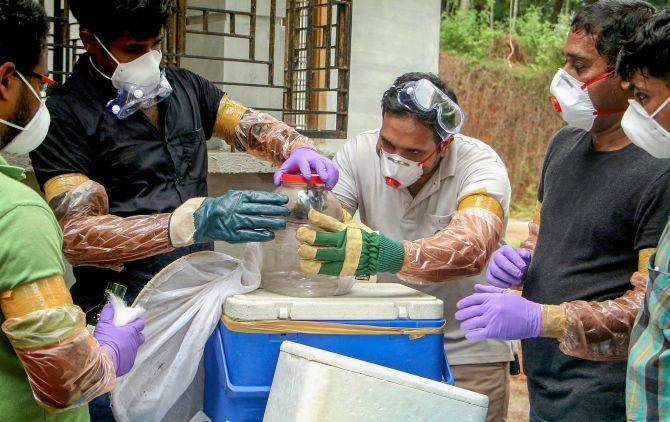The outbreak of Nipah virus in Kerala has so far claimed three lives, while one person is undergoing treatment and eight are under observation, Health minister K K Shylaja said on Monday.

Five more people have died due to high fever and similar symptoms of the virus in Kozhikode and neighbouring Malappuram districts.
But it has not yet been confirmed if these deaths were due to Nipah, health department sources said.
Considering the seriousness of the situation, the Centre rushed a high-level team from the National Centre for Disease-Control, including its director, Dr Sujeet Kumar Singh and Head of Epidemiology, Dr S K Jain, which arrived on Monday.
The team visited Changarothu amd Perambra from where the virus was first reported and took stock of the situation.
Kerala Chief Minister Pinarayi Vijayan said that the government was handling the issue with 'utmost seriousness'.
'Three persons are confirmed to have died of Nipah virus. The samples of others suspected to have been infected have been sent for testing and the results are awaited,' he said in a statement.
He said the health department was taking all steps to ensure that the virus does not spread.
'All efforts are also being made to ensure that more lives are not lost,' Vijayan said.
Instructions have been issued to private hospitals not to deny treatment to those reaching hospitals with fever,he said.
The three deaths, which occurred over the past fortnight, were from the same family, including two siblings in their early twenties.
The man undergoing treatment for 'Nipah' is the father of the two brothers who died.
Two more nurses from Perambra have been admitted to the Kozhikode Medical college hospital with high fever.
Nipah virus (NiV) infection is a newly emerging zoonosis that causes severe disease in both animals and humans.
The natural host of the virus are fruit bats of the Pteropodidae family, Pteropus genus.
Dead bats were found from the well of the house belonging to the family which had lost 3 of its members to the virus.

The well has been closed, the health minister said.
A nursing assistant, Lini, who had treated three infected persons, died this morning.However, it was yet to be confirmed if she had contracted the virus.
The young woman, who is survived by husband and two sons aged 7 and 2, was cremated in an electric crematorium on Monday morning.
Health minister Shylaja and Labour minister T P Ramakrishnan held discussions with officials and assured that the government was taking necessary steps to prevent spread of the virus, which has affected the state for the first time.
The state has been put on high alert and two control rooms have also been opened Kozhikode.
Shylaja said there was no need to panic as the virus spreads only through direct contact with the infected person.
"We have listed the persons who have got in touch with the patients. They have been isolated as a precautionary measure," she said.
The health minister said peripheral hospitals in the vicinity of the Medical college have been asked to set up isolation wards and if they have patients with symptoms of the virus, they should be directed to the medical college.
According to the WHO website, NiV was first identified during an outbreak of disease in Kampung Sungai Nipah, Malaysia, in 1998, when pigs were the intermediate hosts.
However, in subsequent NiV outbreaks, there were no intermediate hosts.
In Bangladesh in 2004, humans became infected with NiV as a result of consuming date palm sap that had been contaminated by infected fruit bats.
Human-to-human transmission has also been documented, including in a hospital setting in India.
NiV infection in humans has a range of clinical presentations, from asymptomatic infection to acute respiratory syndrome and fatal encephalitis.
NiV is also capable of causing disease in pigs and other domestic animals.
There is no vaccine for either humans or animals. The primary treatment for human cases is intensive supportive care, according to WHO.










